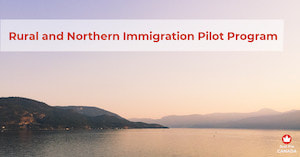Through the Rural and Northern Immigration Pilot (RNIP) Program, the federal government had enabled smaller communities that are participating in the pilot to benefit from economic immigration by creating a path to permanent residence for foreign workers.
Overview of the Rural and Northern Immigration Pilot Program
|
The Rural and Northern Immigration Pilot (RNIP) is a community-driven program in which participating communities take the lead in attracting workers and matching them with local job vacancies, promoting a welcoming community, and connecting newcomers to established members of the community and local settlement services.
|
The RNIP is a pilot program launched in 2019 and is set to expire on February 2024 (candidates will have until August 2024 to submit their permanent residency application to IRCC).
The specific allocation for the RNIP is 2,750 applications per year, processed on a first-come, first-served basis.
A job offer is needed to be eligible for this pilot program, however, a labour market impact assessment (LMIA) is not required.
The specific allocation for the RNIP is 2,750 applications per year, processed on a first-come, first-served basis.
A job offer is needed to be eligible for this pilot program, however, a labour market impact assessment (LMIA) is not required.
Eligible communities under the Rural and Northern Immigration Pilot Program
To be eligible to the Rural and Northern Immigration Pilot (RNIP) Program, you must have a community recommendation from one of eleven participating communities :
There are eligibility criteria that you need to meet before applying for a community recommendation.
- North Bay, Ontario
- Sudbury, Ontario
- Timmins, ON
- Sault Ste. Marie, Ontario
- Thunder Bay, Ontario
- Brandon, Manitoba
- Altona/Rhineland, Manitoba
- Moose Jaw, Saskatchewan
- Claresholm, Alberta
- Vernon, British Columbia
- West Kootenay (Trail, Castlegar, Rossland, Nelson), British Columbia
There are eligibility criteria that you need to meet before applying for a community recommendation.
Applicant eligibility criteria under the Rural and Northern Immigration Pilot Program
Below is a summary of the eligibility requirement of the Rural and Northern Immigration Pilot (RNIP) Program:
1. Job Offer:
The following requirements must be met for the job offer:
2. Work Experience:
In the last 3 years, you must have worked outside or inside Canada at least 1,560 hours (equivalent to 1 year if you were working 30h/week).
The following requirements apply:
You do not need to meet the work experience requirements if you are an international graduate with a degree, diploma, certificate, or trade or apprenticeship from a post-secondary program from a Canadian publicly funded institution in the participating community recommending you :
3. Education:
The minimum education requirements are a Canadian high school diploma, or the equivalent outside Canada.
If you studied outside Canada, you need an Educational Credential Assessment (ECA). You can learn more about how to request an ECA here.
4. Language proficiency:
The minimum language requirements for each of the four language ability, speaking, listening, reading and writing, depends on NOC TEER category of the job offer :
5. Intent to live in the community and community-specific requirement:
You must prove that you intend to live in the community and that you meet the community' additional requirements. You can visit the community's websites to learn more (see previous section for links to their websites).
6. Proof of funds:
You need to have enough money to support yourself and your family when you get to Canada. However, if you are already living and working in Canada with a valid work permit, you do not need to show proof of funds.
The funds required depend on the number of family members (including any dependents that will not immigrate with you). The funds must be yours and must not be borrowed. Below is a table with the required funds, last updated by IRCC on April 25, 2023.
1. Job Offer:
The following requirements must be met for the job offer:
- Must be in the participating community (location of work must be in the community and employer must continue running their business in the community).
- Must be full time and non-seasonal, and permanent.
- Must have a wage that meets or exceeds the Job Bank’s prevailing minimum wage for the occupation in the province of employment (or at the national level if no provincial rate is available).
- Must be for an occupation at a skill level related to the NOC TEER category that matches your work experience, unless for certain health care sector jobs:
- Job offer: TEER 0 or 1 | Work experience requirement: TEER 0, 1, 2, 3
- Job offer: TEER 2 or 3 | Work experience requirement: TEER 1, 2, 3 or 4
- Job offer: TEER 4 | Work experience requirement: TEER 1 (for health care exception only), 2, 3 or 4
- Job offer: TEER 5 | Work experience requirement: must be in the same 5-digit NOC code.
2. Work Experience:
In the last 3 years, you must have worked outside or inside Canada at least 1,560 hours (equivalent to 1 year if you were working 30h/week).
The following requirements apply:
- Count hours worked part-time or full-time (can be in different occupations and with different employers). The hours must have been worked over a total period of at least 12 months.
- Count only paid hours of work (volunteering or unpaid internships do not count).
- Don’t count hours when you were self-employed, unless the experience was acquired as a medical practitioner entitled to practise medicine under the laws of the jurisdiction.
- Don't count hours when not authorized to work.
You do not need to meet the work experience requirements if you are an international graduate with a degree, diploma, certificate, or trade or apprenticeship from a post-secondary program from a Canadian publicly funded institution in the participating community recommending you :
- of 2 years or longer, or
- less than 2 years if master’s degree or higher.
- received the credential no more than 18 months before your application for permanent residence,
- been a full-time student for the entire time you were studying, and
- been living in the participating community recommending you:
- at least 16 months during the last 2 years before you graduated, or
- the duration of your degree if master's degree or higher.
3. Education:
The minimum education requirements are a Canadian high school diploma, or the equivalent outside Canada.
If you studied outside Canada, you need an Educational Credential Assessment (ECA). You can learn more about how to request an ECA here.
4. Language proficiency:
The minimum language requirements for each of the four language ability, speaking, listening, reading and writing, depends on NOC TEER category of the job offer :
- TEER 0 or 1: CLB6
- TEER 2 or 3: CLB5
- TEER 4 or 5: CLB4
5. Intent to live in the community and community-specific requirement:
You must prove that you intend to live in the community and that you meet the community' additional requirements. You can visit the community's websites to learn more (see previous section for links to their websites).
6. Proof of funds:
You need to have enough money to support yourself and your family when you get to Canada. However, if you are already living and working in Canada with a valid work permit, you do not need to show proof of funds.
The funds required depend on the number of family members (including any dependents that will not immigrate with you). The funds must be yours and must not be borrowed. Below is a table with the required funds, last updated by IRCC on April 25, 2023.
Minimum required funds (2023-2024)
Number of Family Members |
Funds Required (in Canadian dollars) |
1 |
2,367 CAD |
2 |
2,947 CAD |
3 |
3,623 CAD |
4 |
4,399 CAD |
5 |
4,989 CAD |
6 |
5,627 CAD |
7 |
6,265 CAD |
For each additional member |
637 CAD |
Application Procedure
When the Rural and Northern Immigration Pilot (RNIP) Program eligibility requirements are met, you will need to first apply for the community recommendation. Each community has its own recommendation process (more information in each community's website in the eligible communities section).
After receiving the recommendation, you can apply for RNIP Program online (you can apply on paper only if you can't apply online and require accommodations, including for a disability).
You must fill out application forms and upload documents such as the job offer, proof of work experience, education, language proficiency, etc. and pay the fees.
If you are currently working in Canada, you are NOT eligible to apply for a Bridging Open Work Permit. However, you are eligible for a 1-year employer-specific work permit.
Your immediate family members (spouse, common-law partner and children) may also be eligible for an open work permit.
After receiving the recommendation, you can apply for RNIP Program online (you can apply on paper only if you can't apply online and require accommodations, including for a disability).
You must fill out application forms and upload documents such as the job offer, proof of work experience, education, language proficiency, etc. and pay the fees.
If you are currently working in Canada, you are NOT eligible to apply for a Bridging Open Work Permit. However, you are eligible for a 1-year employer-specific work permit.
Your immediate family members (spouse, common-law partner and children) may also be eligible for an open work permit.
Application Fees
The application processing fee is $950 and the Right of Permanent Residence Fee (RPRF) is $575, making a total of $1,525 for a single applicant.
If you include a spouse/partner, you will have to pay the same fees twice, which makes it a total of $3,050 for a couple.
If you include a dependent child, you have to add $260 for each child.
Biometrics fees ($85 for one person, or maximum $170 for a family of more than two) will probably be added to your total. You can find more information on Biometrics in this page.
If you include a spouse/partner, you will have to pay the same fees twice, which makes it a total of $3,050 for a couple.
If you include a dependent child, you have to add $260 for each child.
Biometrics fees ($85 for one person, or maximum $170 for a family of more than two) will probably be added to your total. You can find more information on Biometrics in this page.
Processing Times
Immigration, Refugees and Citizenship Canada (IRCC) does not have a target service standard of processing for Rural and Northern Immigration Pilot Program applications.
As of time of writing, the Rural and Northern Immigration Pilot Program does not publish average processing times.
As of time of writing, the Rural and Northern Immigration Pilot Program does not publish average processing times.



